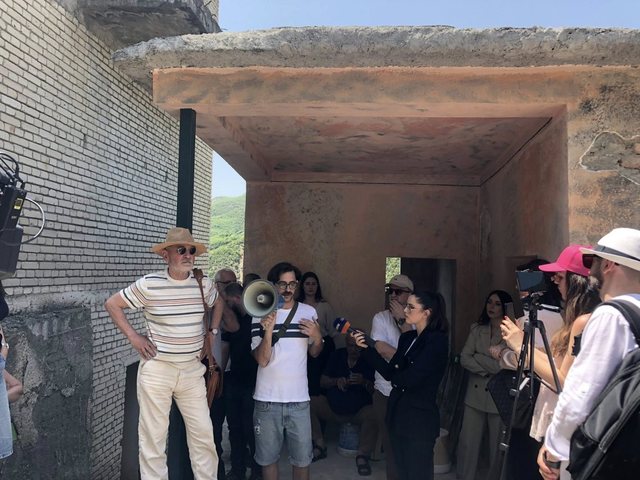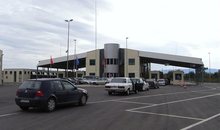
 Flash News
Flash News
Temperatures up to 40 degrees! Weather forecast for today
'Bankers' tax evasion, Chinese CEO and former director jailed
Two cars collide on the Saranda-Delvina axis, 4 injured
Bomb alert, Police remove MPs and media from Kosovo Parliament building
"The will of the people" and the irony of ordered resignations
After calling civil society's concerns 'a lie', Gonxha lowers his tone regarding the interventions in the former Spaç prison

The Minister of Economy and Culture, Blendi Gonxhja, reacted for the second time on Saturday to the intervention undertaken by the National Institute of Cultural Heritage (IKTK) in the former Spaç prison, promising transparency in the implementation of the project.
"The reconstruction of the bathrooms and the terrace above them is not part of the intervention, nor has it been approved by IKTK, nor is it included in the project or contract," Gonxha said in a statement on Facebook, which he said came as a result of the ongoing debates in public media and social media.
"Other elements such as a metal tower, a piece of fencing, a gate and a railing fragment, included in the contract, will be realized only after detailed disassembly, based on photos and historical evidence, and will be demountable in the event of other future interventions according to the Management Plan," Gonxha added, while promising that any information will be public.
The Spaç prison camp was built by the Enver Hoxha regime in 1968 to exploit the manual labor of thousands of political prisoners in the extraction of copper and pyrite in the mine.
The IKTK's intervention, which aims to pave the way for the filming of a feature film about the 1973 revolt – after which four prisoners were executed and dozens of others were re-sentenced – has raised concerns among heritage and historical memory activists, as well as former prisoners and their families.
The feature film will be shot in the former prison premises by director Namik Ajazi, who previously told BIRN that the interventions were being made with the approval of Prime Minister Edi Rama.
Through a petition, dozens of civil society organizations asked the Ministry of Economy and Culture, as well as the IKTK, to suspend the works, which according to them do not respect the authenticity of the object.
"Recently published images and information on the ground show that construction work is being carried out in the protected area - walls with new blocks and plastering of buildings that erase the traces of time, seriously endangering the authenticity of the building," the activists say in the petition sent to the authorities.
"These interventions contradict the living testimonies of former political prisoners in this prison and the archival records of the time," they emphasize.
According to civil society organizations, IKTK's intervention also conflicts with the Spaç Management Plan.
On Saturday, dozens of activists and former political prisoners who have suffered in the notorious prison – including writer Fatos Lubonja, gathered for the second day in Spaç to oppose the IKTK's interventions.
A day earlier, the Minister of Economy and Culture, Blendi Gonxhja, who is seen as a possible candidate for mayor of Tirana, described the concerns of former prisoners and activists as "unnecessary noise", labeling them as "the Sancho Panchos of old politics".
Sancho Pancho is one of the most famous characters in world literature, the right-hand man and faithful companion of Don Quixote in the classic novel Don Quixote of La Mancha by Miguel de Cervantes. He is a contrasting figure to Don Quixote's idealism and represents the voice of reason.
Protests by civil society and former political prisoners seem to have brought Bledi Gonxhe to his feet. However, it remains unclear whether the minister has called to mind and will stop the IKTK's intervention in Spaç. Reporter.al
Latest news



2-year-old girl drowns in family pool in Kosovo
2025-07-06 09:11:18
Albania, as a migration laboratory
2025-07-06 08:54:18
Today's horoscope, what the stars have predicted for each sign
2025-07-06 08:37:51

Temperatures up to 40 degrees! Weather forecast for today
2025-07-06 08:00:35
Morning Post/ In 2 lines: What mattered yesterday in Albania
2025-07-06 07:45:21
When 90 minutes awaken decades of history: Albania – Serbia, beyond football
2025-07-05 21:51:55
Not only the body, swimming also helps the brain
2025-07-05 21:02:49
"Be careful with the water", Alimehmeti warns about the health risks of summer
2025-07-05 20:39:10
PSG beats Bayern Munich 2-0, advances to Club World Cup semifinals
2025-07-05 20:19:38

Two vehicles collide on the Elbasan-Peqin axis, drivers injured
2025-07-05 19:26:29

What does Zelenskyy have more than Zegjineja?
2025-07-05 18:45:26

Fiscal peace, but at a cost
2025-07-05 18:00:10
'Bankers' tax evasion, Chinese CEO and former director jailed
2025-07-05 17:39:21
Kyle Walker joins English club on two-year deal
2025-07-05 17:20:24
Two cars collide on the Saranda-Delvina axis, 4 injured
2025-07-05 17:05:29
Touching gesture! Liverpool will pay Jota's family's salary until 2027
2025-07-05 16:45:18
The zodiac signs that cheat most often
2025-07-05 16:25:53

"I asked for the dismissals", Dredha tries to soften Rama's 'blow' in Vlora
2025-07-05 15:48:49
Bomb threat in Parliament, prosecutor: It was a lie
2025-07-05 15:22:28

Bardhi: The recount revealed how greedy Zeqine Balluku is in stealing
2025-07-05 14:44:29
Knife wound on the secondary road Tirana-Durrës, perpetrator sought
2025-07-05 14:37:54
Tears and pain, Diogo Jota is escorted to his final home
2025-07-05 14:21:34
Success starts with yourself! Simple ways to invest in personal development
2025-07-05 13:58:50
Unlicensed firearms found in apartment, 50-year-old arrested in Lushnje
2025-07-05 13:43:11

Tirana Court remands Skerdi Sina to prison
2025-07-05 12:59:34
Cocaine laboratory in Greece, here are the Albanians arrested and wanted
2025-07-05 12:40:16
Directed Justice/Vangjeli: SPAK does not investigate any scandal involving Rama
2025-07-05 12:22:03

Bomb alert, Police remove MPs and media from Kosovo Parliament building
2025-07-05 11:48:16
"The will of the people" and the irony of ordered resignations
2025-07-05 11:32:05
Summer drowning risk: How to enjoy the water without risking your life
2025-07-05 11:20:27
Fire situation in the country, 16 fires reported in 24 hours, 4 still active
2025-07-05 11:07:04
Car hits pedestrian at white lines, injured in serious condition in Vlora
2025-07-05 10:59:58
Mosquito-borne diseases are a growing problem in Europe
2025-07-05 10:44:13



One of Sweden's most dangerous and wanted criminals arrested in Turkey
2025-07-05 09:38:29
Foreign exchange/ How much foreign currencies are bought and sold today
2025-07-05 09:18:38

"Don't be influenced by the opinions of others", today's horoscope
2025-07-05 08:40:50

Morning Post/ In 2 lines: What mattered yesterday in Albania
2025-07-05 08:02:07

Trump says he's ready to raise tariffs to 70% on some countries
2025-07-04 22:35:52
Tre shenjat e zodiakut që do ‘pasurohen’ në Korrik
2025-07-04 22:05:09
Gaza War: Hamas Accepts US Proposal for 60-Day Ceasefire
2025-07-04 21:50:10
Autocracy in Albania, Fuga: Governance has gotten out of control
2025-07-04 21:40:51
Meta: Agriculture on credit, the new fraud!
2025-07-04 21:26:39




Vote recount in Durrës ends without changes
2025-07-04 20:12:54
Gas station explodes in Rome, 25 injured (VIDEO)
2025-07-04 20:00:20

These afternoon habits often sabotage weight loss
2025-07-04 19:39:28
Former Arsenal player Thomas Partey accused of rape
2025-07-04 19:24:21
Shepherd disappears without a trace in Delvina
2025-07-04 19:14:31

Bardho gave Zegjine's mandate/Braho: Unfair! It violates the electoral system
2025-07-04 19:01:08


Rapid developments in the Sultanates!
2025-07-04 18:00:06



Italy tightens rules for skateboard traffic
2025-07-04 17:20:18

Unusual for the time, dense fog covers the coast of Vlora
2025-07-04 16:48:01


Accident on the Shkodra-Lezhë axis, one dead and 3 injured
2025-07-04 16:14:19
Albania with fewer requests for asylum and Albanian citizenship in 2024
2025-07-04 16:06:57

Albania last for quality of life, DP: Technical government is the solution!
2025-07-04 15:42:30
Nico Williams says "No" to Barcelona, signs with Athletic Club until 2035
2025-07-04 15:33:35
Fires in the country, four fires are still active, what is the situation?
2025-07-04 15:24:20

Summer brings big changes for these 4 zodiac signs
2025-07-04 15:00:04
Osmani: MPs need to agree to a secret ballot for the Speaker of Parliament
2025-07-04 14:51:09
Serious accident on the Peqin-Elbasan axis, two injured
2025-07-04 14:37:56

GJKKO leaves in force the security measure for the head of the KPP
2025-07-04 13:58:17
Who will replace Ilir Meta and take over the leadership of the PL?
2025-07-04 13:50:36
Berisha: Dismissal of directors in Vlora, another act of 'scapegoats'
2025-07-04 13:41:46




